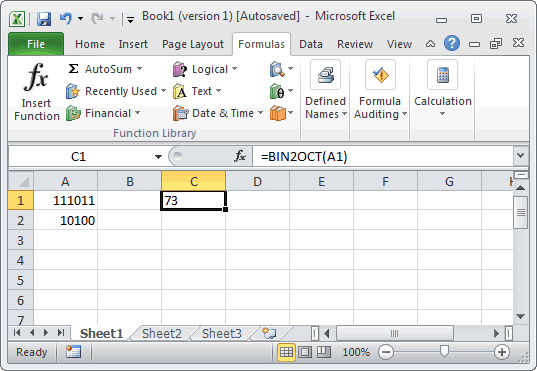This Excel tutorial explains how to use the Excel BIN2OCT function with syntax and examples.
places is optional. It is the number of characters to use when displaying the results. It will pad the front of the result with 0's to fill the characters, if necessary.

Based on the spreadsheet above, the following Excel BIN2OCT examples would return:
Description
The Microsoft Excel BIN2OCT function converts a binary number to an octal number.Syntax
The syntax for the Microsoft Excel BIN2OCT function is:BIN2OCT( binary_number, [places] )
Parameters or Arguments
binary_number is the binary number that you wish to convert to an octal number.places is optional. It is the number of characters to use when displaying the results. It will pad the front of the result with 0's to fill the characters, if necessary.
Applies To
The BIN2OCT function can be used in the following versions of Microsoft Excel:- Excel 2013, Excel 2011 for Mac, Excel 2010, Excel 2007
Type of Excel Function
The BIN2OCT function can be used in Microsoft Excel as the following type of function:- Worksheet function (WS)
Example (as Worksheet Function)
Let's look at some Excel BIN2OCT function examples and explore how to use the BIN2OCT function as a worksheet function in Microsoft Excel:
Based on the spreadsheet above, the following Excel BIN2OCT examples would return:
=BIN2OCT(A1) Result: 73 =BIN2OCT(111011) Result: 73 =BIN2OCT(A2) Result: 24 =BIN2OCT(10100) Result: 24 =BIN2OCT(111111) Result: 77 =BIN2OCT(111111, 4) Result: 0077 =BIN2OCT(111111, 5) Result: 00077





